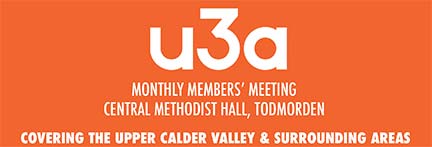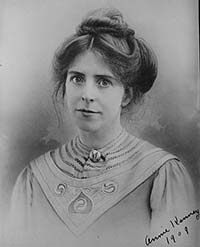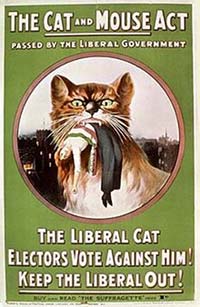
It's not all about the Pankhursts
Speaker: Charlotte Gringras
Tuesday, 24 January 2023
The first u3a Todmorden monthly meeting of 2023 was on Thursday the 19th of January, and our guest speaker was Charlotte Gringras who presented: 'It's not all about the Pankhursts'.
 Charlotte began by saying that she wasn't a historian, but after two discoveries about her family she began to research the suffragette movement. The first was learning that her grandmother had been an active Suffragette and, secondly, her grandfather knew about this but had never mentioned it.
Charlotte began by saying that she wasn't a historian, but after two discoveries about her family she began to research the suffragette movement. The first was learning that her grandmother had been an active Suffragette and, secondly, her grandfather knew about this but had never mentioned it.
Charlotte has a Jewish heritage, which meant that her grandmother had to be buried within 24 hours of passing away, followed by seven days of 'open house', where friends and relatives call and talk about the person that has died. In that week, Charlotte spoke to many people who knew much more of her grandmother's history. This prompted more research and ideas to feature in her writing. She knew already that her grandmother had been a lone teenage immigrant who entered Britain, and who subsequently became an established businesswoman. After talking to the relatives and friends, she had the 'nugget' of her first fictional novel.
She told us more about one of the ways she wrote her books, which was to carefully authenticate, as far as possible, all the things she had been told – in this case by the mourners and friends. Following that, she would thin out the facts and then create a fiction which included the facts she had learned and researched, being careful not to insult any living person.
At the same time she began looking into studying the life and work of suffragettes, and actually found that it 'wasn't just all about the Pankhursts',
One of her first discoveries was that, during the time that Suffragettes were being established, so was the Royal Society for the Protection of Birds, founded in 1890. Both of these movements involved strong Mancunian women. There was, to say the least, significant opposition to both causes at this time and some of this actually came from other women, who became known as 'Antis'.
The press also began to campaign against the movement, and Charlotte had brought a number of illustrations and posters for our members to look at. Even the name 'Suffragette' was used to try and convey the non-importance of the campaigners, as the word 'ette' in French means 'a small version'.
As an aside, Charlotte mentioned the opposition to the RSPB – in addition to the popularity of shooting game birds around this time, famously by the future King Edward VII and his guests on royal estates, the bird feathers were widely used in the manufacture of hats worn by women, as seen from photographs and other images of the time. Also, the meat from the birds was part of the country's diet.
This situation was highlighted in the Suffragette's campaigning. The factories producing the meat were owned by men, and women worked in them. The same applied to the hat factories, but the women working there were in danger from the dust in the feathers, as well as the mercury that was used in the hat making process.
Photographs and other pictures show Suffragettes wearing hats with feathers, Charlotte suggested that the more important than the campaigners, for example the Pankhursts themselves, the bigger the feathers in their hats. This created something of a conflict with the women campaigning for the protection of wild birds.
There was another women's campaign happening alongside, but not exactly with, the Suffragettes. This was the Suffragists, who were trying to improve the opportunities for education for women. The Suffragists however, were opposed to the direct actions, which included criminal damage, carried out by the Suffragettes. Generally, in the last decade of the 19th century, there was a widely held view among women that it was 'unladylike' to speak out about possible discrimination and disadvantages to their sex, let alone take an active part in trying to change the situation.
The first proclamation of Women's Suffrage was made in 1889, but in the same year another movement called Organisation Against Women's Suffrage was formed. There were numerous local, and similar groups in the country also being formed. But the reaction of much of the country's population, in particular men, continued as well. The groups that were formed were often given derogatory names, one of these was the Women's Social and Political Union organised by Emmeline Pankhurst (WSPU), nicknamed 'the wisspoos'.
Around the same time, Emmeline's sister Christabel made a speech which included the words 'Any class which is denied the vote is branded as inferior, women's disenfranchisement is to be their perpetual lesson in servility and to many it teaches arrogance and injustice where their dealings with women are concerned'
 Women's suffrage continued to be discussed, but progress was slow. The King's speech in 1905 made no mention of the subject, even though by this time it had been mentioned in Parliament. Soon after this, a mill worker called Annie Kenny made a speech at Caxton Hall, London where she spoke out against politicians - Charlotte pointed out that the only way she could have attended this event was because her husband had agreed to look after their children at home – this indicated that not all men were set against taking part in the cause. Annie became a prominent figure in women's suffrage, and was sent to prison – numerous times - and is remembered as being one of the victims of the 'Cat and Mouse' Act, where women on hunger strike were released from prison when they were near death, then put back again when their health recovered. While this practice went on, the press continued to oppose the women's cause, with headlines such as 'Let them starve'.
Women's suffrage continued to be discussed, but progress was slow. The King's speech in 1905 made no mention of the subject, even though by this time it had been mentioned in Parliament. Soon after this, a mill worker called Annie Kenny made a speech at Caxton Hall, London where she spoke out against politicians - Charlotte pointed out that the only way she could have attended this event was because her husband had agreed to look after their children at home – this indicated that not all men were set against taking part in the cause. Annie became a prominent figure in women's suffrage, and was sent to prison – numerous times - and is remembered as being one of the victims of the 'Cat and Mouse' Act, where women on hunger strike were released from prison when they were near death, then put back again when their health recovered. While this practice went on, the press continued to oppose the women's cause, with headlines such as 'Let them starve'.
Women made a huge contribution to the country in the First World War. With millions of men away from home, women filled manufacturing and agricultural positions on the home front. Others provided support on the front lines as nurses, doctors, ambulance drivers, translators and, in rare cases, on the battlefield.
Despite this, it wasn't until the Equal Franchise Act of 1928 that women over 21 were able to vote, and women finally achieved the same voting rights as men. This was some years after legislation for the protection of Wild Birds had come into force.
At the end of her presentation, Charlotte answered questions from the audience about women's situations of today, such as safety, and how we might aid and support women in countries which still deny women their voting, and other human rights. After a vote of thanks, the meeting ended – with many members taking an interest in the posters and literature brought by our first guest speaker of 2023.
The next Todmorden U3A Monthly Members Meeting will be on Thursday the 16th February, open to all fully paid-up members at the Central Methodist Hall, Todmorden. Our speaker and entertainer will be Roger Browne, who will present 'The Great American Songbook'
Not yet a member? You can attend one talk free by requesting an invitation to this zoom event. We're always delighted to welcome new members. Contact details: website at www.u3atod.org.uk or email at info@u3atod.org.uk.
Many thanks to Colin Sanson for this report
Previous U3A reports on the HebWeb - click here

